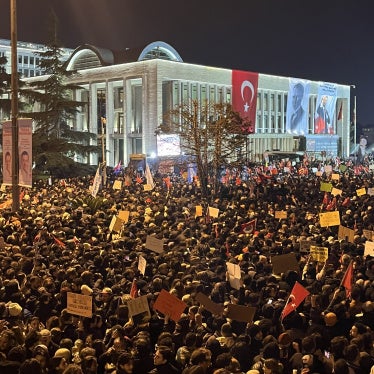New York--Human Rights Watch/Helsinki today condemned the Serbian government's torture and maltreatment of 18 ethnic Albanians from Kosovo who went on trial yesterday on charges of terrorism. At the same time, the human rights organization criticized the European Union for granting Yugoslavia preferential trade status last month while these abuses were taking place.
The 18 ethnic Albanians are part of approximately 100 people arrested at the end of January 1997 after a spate of terrorist attacks in Kosovo (55 are facing criminal charges). Lawyers for the defendants told Human Rights Watch/Helsinki that at times they were denied access to their clients for as many as eight days and that most of their clients had been severely beaten while in detention. Some confessed after being tortured. The defendants are accused of committing terrorist acts (Article 125 of the Serbian Criminal Code) and membership in a hostile organization (Art.136, paragraph 1) -- The National Movement for the Liberation of Kosovo, a clandestine organization that calls for the secession of Kosovo from Yugoslavia by violent means. Another group, the Kosovo Liberation Army, has taken credit for killing a number of Serbian officials and policemen since February 1996, as well as two ethnic Albanians they accused of collaborating with the Serbian government. After a number of the attacks the police conducted wide-scale arbitrary arrests in the area of the attack, often beating those they had taken into detention.
Human Rights Watch/Helsinki respects the right of the Serb authorities to investigate and prosecute those suspected of having organized or committed terrorist acts. But such investigations must conform to domestic and international human rights guarantees. In this case, there is ample evidence that both Serbian and international law have been violated, most egregiously with the use of torture.
In April, while these abuses were taking place, the European Union granted Yugoslavia preferential trade status. Such concessions to President Milosevic demonstrate the international community's indifference to human rights violations, and remove any leverage the international community has to improve human rights conditions in Yugoslavia. "Incidents of torture and political trials after the agreement with the EU are evidence that the policy of positive encouragement has not stopped Serbian President Slobodon Milosevic from committing abuses," said Holly Cartner, Executive Director of Human Rights Watch/Helsinki.
Human Rights Watch/Helsinki sees the political trials in Kosovo as a continuation of the Serbian government's oppression of ethnic Albanians in Kosovo. Trials like these, police abuse and discrimination in education and health care have been part of a state policy to repress ethnic Albanians and encourage their emigration from the region since 1989.








